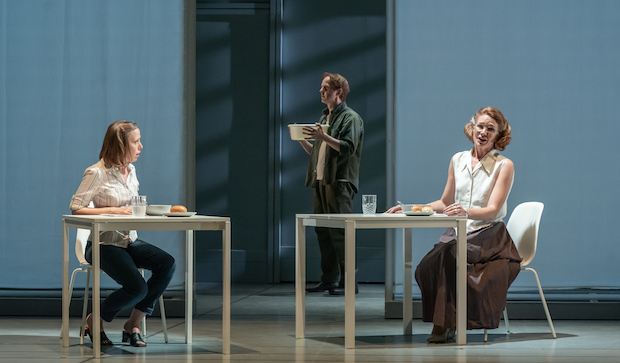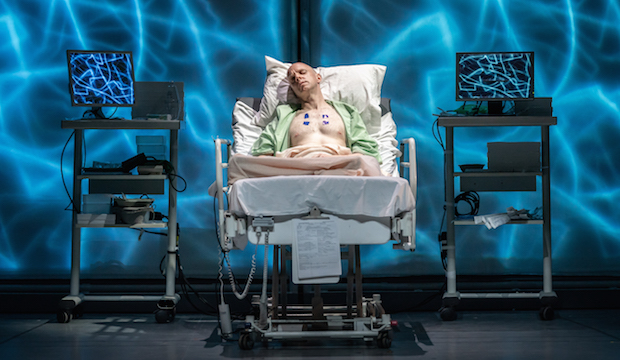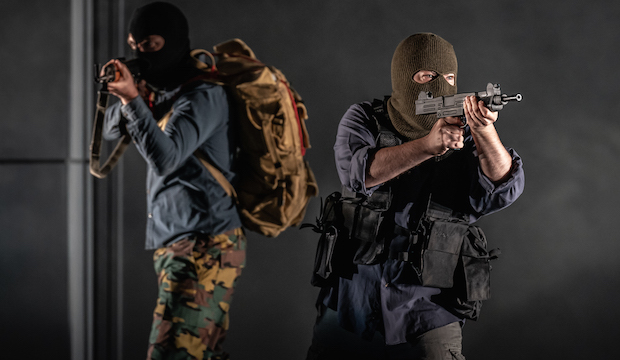The Life and Death of Alexander Litvinenko, Grange Park Opera review ★★★★★
The Russian secret service officer poisoned in his adopted home of London is at the heart of a new opera inspired by his career, marriage and assassination
Boris Berezovsky's birthday is a black tie occasion at Grange Park Opera. Photo: Marc Brenner
If you’ve always assumed that composers writing their first operas are starving in their garrets, think again. Anthony Bolton, whose first opera The Life and Death of Litvinenko is premiered this season by Grange Park Opera, spent his life in the City as a highly successful investment fund manager ('the Harry Potter of investment', apparently) and he wrote Litvinenko from the comfort of his home in Holland Park.
The opera was inspired by the death of Alexander Litvinenko, the former KGB operative who was poisoned with radioactive polonium by Russian agents in London in 2006. The libretto is based on the book Death of a Dissident, written by his widow, Marina, who was in the audience for this performance.
Grange Park Opera has assembled an outstanding team to bring this opera to the stage and the production values were first-rate. The director is Stephen Medcalf, a stalwart of the British opera scene for the last 30 years who now works internationally and has directed at La Scala and Salzburg.
His regular designer, Jamie Vartan, provides a set as bright and clean as an operating theatre, with both live footage from an onstage camera and newsreel archive projected on large screen. Back projections move the action from Blenheim Palace to Moscow and back to the Litvinenkos’ flat in Muswell Hill.

Rebecca Bottone as Marina and Olivia Ray as journalist Anna Politkovskaya. Photo: Marc Brenner
The opera has a thrilling opening scene in which the chorus delivers a sinister, hypnotic chant (shades of American minimalist Philip Glass) describing how a tiny amount of polonium could kill half a city. Blue PPE with which we are all too familiar gives a contemporary, chilling immediacy to the scene.
Even more shockingly, doors at the back of the stage slide open to reveal Litvinenko in hospital, the tenor Adrian Dwyer, with shaven head, looking the exact double of the images we remember of Litvinenko on his deathbed, castigating the Putin regime for his murder.
Suddenly, the auditorium was invaded by soldiers in balaclavas, shouting and firing guns (we had been well warned that this was going to happen), a recreation of the Moscow Theatre siege in 2002 when Chechen militants held over 900 hostages for three days. Russian security services pumped sleeping gas into the theatre, stormed it and killed all the attackers but over 130 of the hostages also died. Mezzo-soprano Olivia Ray sang fearlessly and sympathetically as the journalist Anna Politkovskaya who tried to negotiate for the release of the hostages.
Up to this point, the opera certainly didn’t lack for action but the dramatic temperature dropped when the opera tried to explain the back story of both Litvinenko and Russian politics and at times the opera came perilously close to turning into an illustrated lecture set to music. Bolton is accomplished at writing musical pastiche – and that’s not necessarily a bad thing: Proust was a noted pasticheur of other authors until he found his own authorial voice and style – and look where he ended up.

Adrian Dwyer as Alexander Litvinenko. Photo: Marc Brenner
Bolton writes variously in the style of Russian Orthodox church music, Tchaikovsky, jazz, Khachaturian’s famous waltz, Brechtian cabaret song, Bernstein’s West Side Story and a truly awful football chant – all serving the drama and all perfectly well executed. But his own style has yet to develop a similar vividness and too much of the opera is given over to one character or another singing monologues, reminiscent of Benjamin Britten but without his dramatic instincts.
Drama demands conflict between at least two people and Bolton does not take easily to writing for more than one character at a time. The libretto is by Kit Hesketh-Harvey whose many short scenes failed to connect or build into a coherent dramatic structure. A blistering orchestral interlude before the final death scene suggests that Bolton’s forte at the moment is orchestral rather than vocal writing.
Bolton, with no lack of ambition, scored the opera for no fewer than 67 musicians. The première had been postponed from last year due to Covid and, rather than postponing again or writing a reduced orchestration for socially-distanced forces, the decision was taken to hire the BBC Concert Orchestra to record the score back in March.
It was curious to look into an empty pit and see only the conductor, Stephen Barlow, standing in front of a computer screen, liaising live singers with a recorded soundtrack. The orchestra sounded as if it was backstage and far away, which contributed greatly to the generally low-key atmosphere.

Re-enacting the Moscow Theatre siege. Photo: Marc Brenner
As so often, the ‘baddies’ fared best. Baritone Edmund Danon as Andrei Lugovoy, named as Litvinenko’s assassin by a UK Public Enquiry in 2015, was vividly sleazy. On his return to Russia, Lugovoy became an MP, gaining parliamentary immunity, and Russia refuses to extradite him to the UK where he is still wanted for murder. His character is given a bitingly satiric cabaret song, celebrating how he got away with it and Danon’s sarcastic performance was a welcome relief from the less colourful passages of the score.
The unnamed 'Head of the KGB' is clearly meant to be Putin, and Bolton mischievously cast him as a counter-tenor, perhaps to tone down Putin’s much-publicised macho posturings. James Laing brought off the difficult task of singing the part beautifully whilst making the character profoundly sinister.
Bass-baritone Stephan Loges played Boris Berezovsky, an oligarch who fell out with Putin and moved to the UK where he was found dead in 2013. Berezovsky helped the Litvinenko family move to London, but his character is never fully integrated into the plot. For his 60th birthday party at Blenheim Palace, the lights went up on the chorus, dressed in black tie and evening dress, dancing awkwardly while we the audience, dressed in black tie and evening dress, stared awkwardly back at them.
Soprano Rebecca Bottone, outstanding as Marina, provided the emotional climax to the piece, singing a lament for Litvinenko, her voice soaring over an offstage chorus’s Orthodox prayers. Here, finally, was a truly operatic moment.
The opera was inspired by the death of Alexander Litvinenko, the former KGB operative who was poisoned with radioactive polonium by Russian agents in London in 2006. The libretto is based on the book Death of a Dissident, written by his widow, Marina, who was in the audience for this performance.
Grange Park Opera has assembled an outstanding team to bring this opera to the stage and the production values were first-rate. The director is Stephen Medcalf, a stalwart of the British opera scene for the last 30 years who now works internationally and has directed at La Scala and Salzburg.
His regular designer, Jamie Vartan, provides a set as bright and clean as an operating theatre, with both live footage from an onstage camera and newsreel archive projected on large screen. Back projections move the action from Blenheim Palace to Moscow and back to the Litvinenkos’ flat in Muswell Hill.

Rebecca Bottone as Marina and Olivia Ray as journalist Anna Politkovskaya. Photo: Marc Brenner
The opera has a thrilling opening scene in which the chorus delivers a sinister, hypnotic chant (shades of American minimalist Philip Glass) describing how a tiny amount of polonium could kill half a city. Blue PPE with which we are all too familiar gives a contemporary, chilling immediacy to the scene.
Even more shockingly, doors at the back of the stage slide open to reveal Litvinenko in hospital, the tenor Adrian Dwyer, with shaven head, looking the exact double of the images we remember of Litvinenko on his deathbed, castigating the Putin regime for his murder.
Suddenly, the auditorium was invaded by soldiers in balaclavas, shouting and firing guns (we had been well warned that this was going to happen), a recreation of the Moscow Theatre siege in 2002 when Chechen militants held over 900 hostages for three days. Russian security services pumped sleeping gas into the theatre, stormed it and killed all the attackers but over 130 of the hostages also died. Mezzo-soprano Olivia Ray sang fearlessly and sympathetically as the journalist Anna Politkovskaya who tried to negotiate for the release of the hostages.
Up to this point, the opera certainly didn’t lack for action but the dramatic temperature dropped when the opera tried to explain the back story of both Litvinenko and Russian politics and at times the opera came perilously close to turning into an illustrated lecture set to music. Bolton is accomplished at writing musical pastiche – and that’s not necessarily a bad thing: Proust was a noted pasticheur of other authors until he found his own authorial voice and style – and look where he ended up.

Adrian Dwyer as Alexander Litvinenko. Photo: Marc Brenner
Bolton writes variously in the style of Russian Orthodox church music, Tchaikovsky, jazz, Khachaturian’s famous waltz, Brechtian cabaret song, Bernstein’s West Side Story and a truly awful football chant – all serving the drama and all perfectly well executed. But his own style has yet to develop a similar vividness and too much of the opera is given over to one character or another singing monologues, reminiscent of Benjamin Britten but without his dramatic instincts.
Drama demands conflict between at least two people and Bolton does not take easily to writing for more than one character at a time. The libretto is by Kit Hesketh-Harvey whose many short scenes failed to connect or build into a coherent dramatic structure. A blistering orchestral interlude before the final death scene suggests that Bolton’s forte at the moment is orchestral rather than vocal writing.
Bolton, with no lack of ambition, scored the opera for no fewer than 67 musicians. The première had been postponed from last year due to Covid and, rather than postponing again or writing a reduced orchestration for socially-distanced forces, the decision was taken to hire the BBC Concert Orchestra to record the score back in March.
It was curious to look into an empty pit and see only the conductor, Stephen Barlow, standing in front of a computer screen, liaising live singers with a recorded soundtrack. The orchestra sounded as if it was backstage and far away, which contributed greatly to the generally low-key atmosphere.

Re-enacting the Moscow Theatre siege. Photo: Marc Brenner
As so often, the ‘baddies’ fared best. Baritone Edmund Danon as Andrei Lugovoy, named as Litvinenko’s assassin by a UK Public Enquiry in 2015, was vividly sleazy. On his return to Russia, Lugovoy became an MP, gaining parliamentary immunity, and Russia refuses to extradite him to the UK where he is still wanted for murder. His character is given a bitingly satiric cabaret song, celebrating how he got away with it and Danon’s sarcastic performance was a welcome relief from the less colourful passages of the score.
The unnamed 'Head of the KGB' is clearly meant to be Putin, and Bolton mischievously cast him as a counter-tenor, perhaps to tone down Putin’s much-publicised macho posturings. James Laing brought off the difficult task of singing the part beautifully whilst making the character profoundly sinister.
Bass-baritone Stephan Loges played Boris Berezovsky, an oligarch who fell out with Putin and moved to the UK where he was found dead in 2013. Berezovsky helped the Litvinenko family move to London, but his character is never fully integrated into the plot. For his 60th birthday party at Blenheim Palace, the lights went up on the chorus, dressed in black tie and evening dress, dancing awkwardly while we the audience, dressed in black tie and evening dress, stared awkwardly back at them.
Soprano Rebecca Bottone, outstanding as Marina, provided the emotional climax to the piece, singing a lament for Litvinenko, her voice soaring over an offstage chorus’s Orthodox prayers. Here, finally, was a truly operatic moment.
TRY CULTURE WHISPER
Receive free tickets & insider tips to unlock the best of London — direct to your inbox
| What | The Life and Death of Alexander Litvinenko, Grange Park Opera review |
| Where | Grange Park Opera, West Horsley Place, West Horsley,, Leatherhead, KT24 6AW | MAP |
| Nearest tube | Waterloo (underground) |
| When |
15 Jul 21 – 17 Jul 21, Two performances with long dinner interval; world premiere on Thurs 15 July |
| Price | £40-£220 |
| Website | Click here for more information and booking |